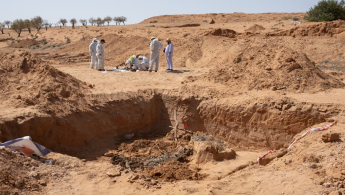Palestinians desperately search for missing families and friends in Nasser hospital's mass graves
The courtyard of Nasser Hospital in Khan Yunis, south of the Gaza Strip, shook with screams. Mariam Abdel al-Aal screamed at others, telling them that one of the bodies recovered from the hospital was her husband, with whom she lost contact two months ago.
What the civil defence man was holding was a torn shirt and worn-out pants that covered the remains of the body, whose features were almost completely decomposed.
Abdel al-Aal began holding the worn-out clothes and telling those in the hospital courtyard, "He is my husband. I know him. He was wearing these clothes on the day I left him in the hospital and fled with my children to Rafah."
"Oh God," she continued to scream, "What happened to my husband? How did they execute him so brutally? He was sick and receiving treatment. He did not commit any sin or any crime. He was just a patient who only wanted treatment and medicine."
Some other women embraced her to calm and console the grieving woman. But their attempts were in vain, as her loss was significant since her husband was the only survivor in his family, who were all killed by an Israeli bombing that targeted their home in Gaza City in November 2023.
"He felt that he was going to die and that he would not survive this damned war (...) He was rescued for the first time from under the rubble of his family's home while all the others were killed (...) Today, he is with them, and he left me alone," the 39-year-old mother of four recalled to The New Arab.
"They [the Israelis] want to kill us all and do not want any Palestinian to stay alive because they know very well that we will take revenge and will not allow them to end our existence, no matter the cost," she added.
Near to the grieving woman, Muhannad Al-Madhoun, a resident of the city of Rafah in the south of the Gaza Strip, was carrying the body of his child after he and his mother were recovered from the hospital yard to be buried in one of the cemeteries in Khan Yunis City.
While he was trying to hold back his tears, he told TNA, "These are the remains and bones of my child. We have not been able until this moment to reach the remains of my wife, and I do not even know if she is dead or if she has been arrested. We are living a nightmare, and we will not be able to get over it."
For five days, Al-Madhoun went to the hospital's courtyard to monitor the civil defence and medical crews as they recovered the bodies of hundreds of Palestinian victims, fearing that no one would identify the dead and that they would be buried without saying goodbye.
"The Israeli army deliberately committed crimes against civilians here to tell us all that it will not have mercy on us at all times and places and that there are no limits to its crimes," Al-Madhoun remarked to TNA.
Meanwhile, Yasser Farwaneh, a 25-year-old man, was unable to identify any of the bodies that were recovered during the past five days, which gave him some hope that his father was still alive and detained by the Israeli army.
"I stopped hearing from my father two months ago today, as he told us in the last call that the Israeli army is carrying out field executions, and whoever is lucky will be arrested," the young man said to TNA.
🧵Israel's war on Gaza
— The New Arab (@The_NewArab) April 24, 2024
👉Nth towns Beit Lahia, Beit Hanoun, Jabalia report intense Israeli strikes
👉Israeli strikes Abu Araban School (Nuseirat camp), kills 3
👉Israeli forces strike "2 Hamas launch posts" in sth; "50 targets" in c'tral Gaza
🔴Updates: https://t.co/o3WFx22fwU pic.twitter.com/DjOZQqzo54
"My father was afraid that he would be arrested because of the torture by the Israeli soldiers...but we prefer that he is still alive. At least we hope we will know his fate one day," he added.
In early April, the Israeli army withdrew from Khan Younis city, as well as other governorates of Gaza, leaving behind enormous destruction and hundreds of bodies scattered inside and around Nasser Hospital.
Since then, the Palestinian medical and civil defence staff have recovered the bodies of Palestinians buried in mass graves in the hospital's courtyard.
"So far, we have recovered about 300 bodies from the hospital; some of them were women, children, elderly people and even medical staff," Mohammed al-Mughayar, an official at the civil defence in Gaza, said to TNA.
"Israeli army deliberately executed the victims after tying their hands and feet (...) we hardly can recognise their attributes, mainly as some of them were cut into parts," he added.
According to al-Mughayar, the medical and civil staff are trying to release the details of the clothes of the victims to residents of the area, asking them to provide more information about the dead.
He expected local authorities in Gaza might find other mass graves in and around the Nasser hospital.
Meanwhile, the Hamas-run government media office in Gaza said that the fate of at least 2,000 people who were inside Nasser hospital remains unknown.





 Follow the Middle East's top stories in English at The New Arab on Google News
Follow the Middle East's top stories in English at The New Arab on Google News


